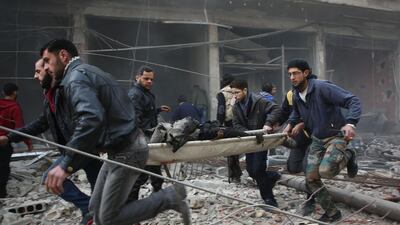United Nations war crimes investigators are probing the suspected use of chemical weapons in the latest attacks by Syrian government forces on rebel-held areas the regime is pushing to reclaim.
The disclosure came after airstrikes from the Syrian Air Force killed at least 78 people on Monday and Tuesday in Eastern Ghouta, a Damascus suburb, and more than a dozen further north in Idlib.
The death toll led the UN to call for an immediate one-month ceasefire throughout Syria to allow delivery of humanitarian aid and ensure casualties be taken for treatment.
Idlib is the last province to largely remain outside government control, with deaths rising and thousands being displaced. President Bashar Al Assad's forces have been on the offensive in Idlib in recent weeks but the effort intensified after militants shot down a Russian Su-25 fighter jet near the town of Saraqeb over the weekend.
The lead investigator of a UN mandated Commission of Inquiry on Syria said his team was looking into reports that bombs allegedly containing weaponised chlorine were recently used on two occasions in rebel-held zones.
"These reports are extremely troubling, and make a mockery of the so-called 'de-escalation zones' intended to protect civilians from such bombardment," Paulo Pinheiro said.
The zones - meant to stabilise lines of conflict and open corridors for urgently needed humanitarian relief - were formed last autumn, in an agreement with the Syrian opposition that Russia, Iran and Turkey promised to guarantee.
Mr Pinherio described the Syrian government's siege and indiscriminate bombardment of Eastern Ghouta as "international crimes."
The French foreign ministry said it was concerned by the reports of chlorine being used on civilians, but that it was too soon to confirm them.
The UN also warned of "dire consequences" regarding the humanitarian crisis in Syria, identifying seven areas requiring urgent humanitarian relief.
Mr Pinherio stressed that the ongoing fighting and deliberate obstruction by forces at front lines was blocking aid organisations from reaching civilians.
The UN says it has a plan to reach 700,000 people in the next two months, if it can get access.
________________
Read more:
UN urges truce to bring aid to besieged Syrians
Incubators for newborns shut down after airstrikes hit Idlib hospitals
_______________
The Britain-based Syrian Observatory for Human Rights said 10 towns in the Eastern Ghouta region outside Damascus were bombed on Tuesday. The activist-run Ghouta Media Center said at least two, Douma and Harasta, were struck by ground-to-ground missiles.
The Syrian Civil Defence search-and-rescue group, known as the White Helmets, which works in opposition areas, called it "another bloody day for civilians" in Eastern Ghouta.
The White Helmets released a video on Tuesday showing its workers rushing to rescue victims from underneath the rubble.
More than 340,000 people have been killed in the conflict, which began in 2011 with anti-government protests but then morphed into a brutal civil war.
On Monday, the US clashed with Russia at the UN Security Council over a push by Washington to condemn the reported chlorine gas attacks in opposition-held zones.
US Ambassador Nikki Haley told the council there was "obvious evidence from dozens of victims" to corroborate the chlorine attacks in Eastern Ghouta.
"Now we have reports that the Assad regime has used chlorine gas against its people multiple times in recent weeks, including just yesterday," Ms Haley said.
Russia, Assad's staunchest ally, said "no perpetrators have been identified" and accused the United States of orchestrating a "propaganda campaign" against the Syrian government.
"It's completely clear to us the goal is to basically accuse the Syrian government of chemical weapons use where no perpetrators have been identified," said Russian Ambassador Vassily Nebenzia.
Meanwhile, Turkish operations against Syrian Kurdish forces and US and Russian-backed operations against ISIL continue to compound the suffering of Syrians in the country's north and east.
Turkey launched an incursion into the Kurdish majority enclave of Afrin in north Syria more than two weeks ago.
The area is controlled by the Democratic Union Party (PYD) and its military wing, the People’s Protection Units (YPG), both backed by the United States-led coalition against ISIL, which relied on their fighters on the ground to oust the terror group from its strongholds in Syria, including the city of Raqqa.
But the PYD and YPG are also the Syrian wing of the Kurdistan Workers’ Party (PKK), a designated terror group that has fought a decades-long insurgency against the Turkish state.
As a sign of the strain between Washington and Ankara over the Afrin operation it was reported Tuesday that US Secretary of State Rex Tillerson is expected to visit Turkey next week.


